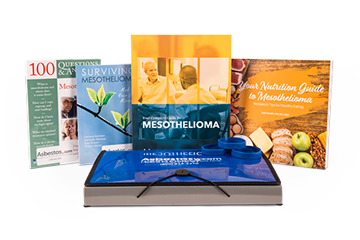The majority of mesothelioma patients learn of their disease when it’s too late, and they often do not survive beyond two years after their diagnosis. But, a number of mesothelioma survivors have extended their survival by electing cancer treatments, participating in innovative clinical trials and integrating alternative therapies.
Some survivors have reached an incredible 10-year mark and continue to serve as living testimonials to beating this disease.
The mesothelioma community celebrates those who survive beyond the average one-year survival rate so that others who find themselves walking the same path have role models to follow.
Need Help Finding a Doctor?
We'll help you or a loved one find the most qualified mesothelioma specialists and treatment facilities.
Get Help Now
Notable Mesothelioma Survivor Stories
Ruth P.
Diagnosis: peritoneal mesothelioma, 1999
Ruth opted against the conventional treatments that were recommended upon her diagnosis of peritoneal mesothelioma in 1999, taking an alternative therapy approach, instead. She found the Immune Augmentative Therapy Centre in Freeport, Bahamas, which focused on rebuilding her immune system, allowed her body to fight off the cancer without the toxicity of chemotherapy or radiation. She returned to Freeport annually for many years and still relies on herbal formulas.
Read Ruth’s full Story
Alexis K.
Diagnosis: peritoneal mesothelioma, 2007
Alexis was diagnosed with peritoneal mesothelioma in 2007, had major surgery that removed part of her diaphragm and kept her wedding plans in place. She still rides to work on her scooter and refuses to let mesothelioma get in the way of a life she and her husband built. They don’t know how many wedding anniversaries they will have, but they celebrate their time together. “It’s kind of cool now to hear people say, ‘You don’t look or act sick,'” she says.
Read Alexis’s full Story
Andy A.
Diagnosis: pleural mesothelioma, 2010
Andy survived a horrific motorcycle crash that almost killed him in 2004, and he has every intention of surviving his 2010 diagnosis of pleural mesothelioma. He was not a surgical candidate because his cancer already had metastasized, but he found something better. With the help of mesothelioma specialist Dr. David Jablons at the University of California-San Francisco, Andy enrolled in a clinical trial involving amatuximab (MORab-009), an experimental immunotherapy drug that is working well for him. “I consider myself extremely lucky for a lot of reasons,” he says. “I haven’t won the lottery yet, but I’m working on that.” Andy now uses medical cannabis as a complimentary therapy.
Read Andy’s full Story
Sydney R.
Diagnosis: pleural mesothelioma, 2011
Sydney nearly died from rheumatic fever more than 60 years ago. She knows what it’s like to fight for her life, which she has done successfully with pleural mesothelioma. She and her husband embarked on an aggressive treatment plan, and took charge of her care by questioning doctors and getting second and third opinions. “I’m an independent, outspoken person,” she says. “I certainly wasn’t ready to say, ‘You win, mesothelioma.’ We attacked this monster with every resource we could find.”
Read Sydney’s full Story
Tim C.
Diagnosis: pleural mesothelioma, 2002
Tim originally decided against surgery and chemotherapy when he was diagnosed with pleural mesothelioma in 2002, but his daughter convinced him otherwise. He traveled to Boston and underwent an extrapleural pneumonectomy at Brigham & Women’s Hospital. The surgery and chemotherapy were taxing, but he has exceeded all expectations. “I’ve done a lot these last 10 years,” he says. “I’m glad I listened to my daughter. My family now is what keeps me going.”
Read Tim’s Full Story
Trina C.
Diagnosis: peritoneal mesothelioma, 2001
Trina traveled the country — and loved every minute of it — after recovering from the cytoreductive surgery and hyperthermic intraperitoneal chemotherapy combination. She was diagnosed at a young age, which gave her a fighting chance at long-term survival. “I was told to get my affairs in order. The diagnosis was devastating, but I was determined to live long enough to see what my two children would become,” she says. “I’ve done that. Now every day is a gift. So I’m out seeing the country.” Her latest adventure? Traveling with a good friend in an 18-wheeler that serves as a home-away-from-home. “If it all ends today, I’ll have no regrets,” she says. “I lived longer than I ever thought I would.”
Read Trina’s Full Story
Michelle M.
Diagnosis: peritoneal mesothelioma, 2002
Michelle wanted something special to commemorate her 10-year milestone as a mesothelioma survivor. She had a tattoo artist write the word FAITH on her left wrist, where she could see it anytime she needed some help. “I do believe everything happens for a reason, and I have faith that God has a plan for me,” she says. “After everything I’ve been through, it would be impossible to think otherwise.” A single mom, Michelle was diagnosed at 44. Her daughter was 5 at the time. The hardest part emotionally was getting past the thought of leaving her daughter at such a young age. “She grew up quickly, taking care of me when I was so sick,” Michelle says. “And now, I live for her.”
Read Michelle’s Full Story
Looking for information on mesothelioma?
Free information, books, wristbands and more for patients and caregivers.
Get your Free Guide Now
Why Do Some Mesothelioma Patients Live Longer Than Others?
Surviving mesothelioma is not an exact science. How long someone lives following a diagnosis depends on a number of factors, including the stage of the cancer, the location of it, how fast it spreads, and a person’s overall health, age and gender. Life expectancy varies from case to case.
Early detection plays a vital role in increasing someone’s chance of becoming a long-term survivor. The earlier that mesothelioma is detected, the more treatment options a patient has. The development of new diagnostic techniques has led to more effective treatments.
Regardless of the type or sub-type of mesothelioma, living beyond one year is above-average survival. Pleural mesothelioma is the most common form of the disease, but the most survivable type is peritoneal mesothelioma.
A knowledgeable specialist can treat the cancer aggressively, increasing your odds of surviving. Finding the right specialist can make a world of difference with a rare cancer such as mesothelioma. Improved surgical techniques, better drug combinations and more targeted therapies are important to increased survival rates.
We feature inspirational stories on our Wall of Hope, including first-person accounts of how these mesothelioma survivors are fighting and winning their battles.
Each survivor has a different story, but all of them share something: hope. We hope their stories inspire you and help you in some way.
In Memoriam: Mesothelioma Survivors We Lost
Wayne N.
Diagnosis: pleural mesothelioma, 1991
Wayne spent his career as a union electrician in Ohio. He was diagnosed with mesothelioma in 1991, and it pushed him into an early retirement. Wayne attributed his success to antioxidants like melatonin that are found in red tart cherries, which he ate every night for more than two decades. “There’s something magical in those cherries,” he said. “I don’t know exactly why they work, but they do.”
Read Wayne’s full Story
Larry D.
Larry lived six years after his diagnosis of mesothelioma, which also killed his father many years before. Larry, who lived in South Florida, was an avid runner who organized the annual Miles for Meso road race in Boca Raton each February. He worked tirelessly to raise awareness of this dreaded disease, and raise money for research. Even after five surgeries, Larry still completed a Father’s Day Triathlon in 2011 with his daughter in North Carolina. He shunned much of the traditional chemotherapy and radiation treatment and relied mostly on immunotherapy and alternative medicine. He died in June 2012.
Read Larry’s full story
Janelle B.
Janelle was diagnosed with pleural mesothelioma at the age of 31, which is unusually young for mesothelioma. Her six-year fight against the disease turned her into a hometown hero in tiny Rushville, Indiana, and a national spokesperson who advocated strongly for more research funding and more diligence in ending the asbestos era in America. The mayor of Rushville designated June 6 as “Wonder Woman Day,” to honor her fight. She played an important role in gaining congressional support for a resolution designating September 26 as National Mesothelioma Awareness Day. She died in 2013.
Read Janelle’s full story
Christine S.
She lived in England and never worked around asbestos, but Christine believed she was exposed to it through her father, who mixed asbestos cement every day on his job site, then wore his work clothes home every night. Christine was diagnosed with mesothelioma in October 2007, years after her father had died, likely of the same disease, although it never was diagnosed. She discovered that repeated chemotherapy shrank the tumor and controlled the disease. It allowed her to be active in various cancer awareness events in the United Kingdom. Christine died August 2013.
Read Christine’s full story
Mike D.
Mike D. underwent his first surgery for mesothelioma in February 2001. After undergoing an additional surgery, as well as other treatments, he remained relatively physically active. He encouraged fellow mesothelioma patients to use the resources around them and rely on loved ones. Mike passed away in September 2011.
Judy G.
Judy was diagnosed with pleural mesothelioma in 1990 and lived with the disease until 2010. In addition to undergoing several extensive surgeries, she relied heavily upon alternative treatments such as meditation, massage therapy and nutritional remedies. Her story is chronicled in the book titled Surviving Mesothelioma: Making Your Own Miracle. She passed away in 2010.
Get a Free Copy of Surviving Mesothelioma & Read Judy’s Story
James O.
James was originally diagnosed with mesothelioma in October 2001. Despite being given less than a year to live, he managed to survive another seven years. O’Connor did not undergo surgery, radiation therapy or chemotherapy, but rather chose to combat his disease through a strict nutritional regimen and mind-body therapy. He died in 2008.
Latest Stories of Survival from the Wall of Hope
When someone is able to beat mesothelioma, even for just a little while, we celebrate with them. The Wall of Hope is a place where survivors and caregivers can share their experiences and journey with this deadly cancer. And we’re always looking for more stories to share.
Read the Latest Survivor Story
Darlene Micciche, Survivor
Attending a dinner party with friends became the motivation Darlene Micciche needed while recovering from cytoreductive [...]



















